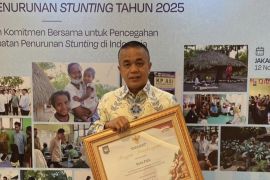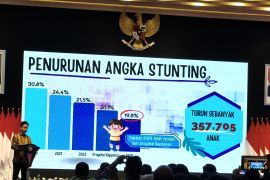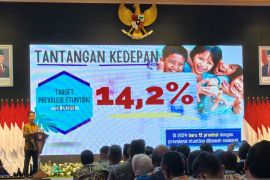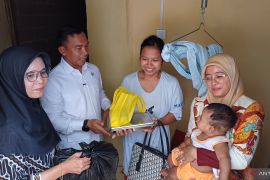Vice President Ma’ruf Amin, during a launch of the book, titled "Moving Forward: Local Initiatives in Reducing Stunting in Indonesia," recently described a golden generation as a generation that is able to bring progress to Indonesia.
Stunting, which is characterized by growth failure in children under the age of two due to long periods of malnutrition, will create a demographic burden generation, as it has the potential to endanger the future of the nation, in terms of education, health, productivity, and the economy.
To ensure realizing the national goal of achieving a golden generation, the government, in 2018, had decided to accelerate the efforts to reduce the stunting rate, particularly among children under the age of five years.
To this end, the government has formulated the National Strategy for Accelerating Stunting Reduction (Stranas Stunting), which emphasizes the strengthening of investment in the first one thousand days of human life.
Amin, who has been tasked with leading the national stunting eradication efforts, claimed that the strategy has helped to reduce the stunting rate, from 30.8 percent in 2018 to 24.4 percent in 2021.
“This achievement is based on hard work, smart work, and collaborative work from all parties, both at the central and regional government levels," he affirmed.
The government has allocated funds amounting to Rp5.6 trillion, or US$378.3 million, for accelerating the maternal mortality and stunting reduction program.
The government has set a target to reduce the prevalence of stunting rates to 14 percent by 2024. Hence, to achieve the target, the nation must be able to reduce the stunting rate by at least three percent annually.
Coordinating Human Development and Culture Minister Muhadjir Effendy explained that based on data from the Indonesian Under-five Children Nutrition Status Survey (SSGBI) in 2021, the prevalence of stunting is currently still at 24.4 percent, or 5.33 million children under five.
The first one thousand days of life is a golden period, so the minister highlighted the need for strengthening the dissemination of information and education in families, especially teen girls, who would one day embrace motherhood.
Teen girls need to eat balanced nutritious foods to maintain a healthy body and avoid anemia. This is essential as a preventive effort to prevent their babies from being born stunted.
Effendy called to thoroughly handle child stunting, as Indonesia will enjoy a demographic dividend that must be utilized optimally.
In addition, educating future brides on several issues, such as reproductive health, family health, family life, and family economy, is crucial.
Hence, the stunting reduction efforts gained momentum when the country commemorated National Family Day (Harganas) this year.
The National Population and Family Planning Agency (BKKBN), which is in the front guard in the fight to reduce stunting, explained that National Family Day 2022 provided a platform for consolidation and coordination of the Stunting Reduction Acceleration Team (TPPK) at the district/city and provincial levels.
BKKBN’s Deputy for Prosperous Families and Family Empowerment Nopian Andusti remarked that the national celebration of the 29th National Family Day, themed "Let's Prevent Stunting So That Families Are Stunting Free," will be organized in Medan, North Sumatra, on June 29, 2022.
Andusti noted that the event will feature several activities conducted by BKKBN, such as the Bapak Asuh Anak Stunting, a program that aims to involve fathers in taking care of stunted children; Sepekan Elsimil, Semarak Kampung KB (birth control in villages); and the Pelayanan KB Serentak Sejuta Akseptor (the Simultaneous Birth Control Service with Million Acceptors).
Regional heads, who excel in controlling stunting rates in their regions, will receive awards as a mark of appreciation by BKKBN for striving together to build quality families.
The agency had organized a Stunting Case Audit Coaching in last May in three provinces as part of the efforts to accelerate stunting reduction.
The coaching focused on efforts to prevent infants from being born stunted, starting from the audit of prospective brides, pregnant, or postpartum women and of children under two and those under five, who are at risk of stunting, Head of BKKBN Hasto Wardoyo explained.
In addition to supporting the selection of stunting cases, auditing stunting cases is expected to open opportunities for consultation and coordination among policymakers, program implementers, and experts regarding activities.
Professional organizations partaking in the audit of stunting cases included the Indonesian Pediatric Society (IDAI), Indonesian Society of Obstetrics and Gynecology (POGI), Indonesian Nutrition Higher Education Association (AIPGI), and Indonesian Psychologists Association (Himpsi).
According to the 2021 family data collection (PK 21), the number of families at risk of stunting in Indonesia had reached 21.9 million.
To support the smooth running of audits, the agency has also formed special teams to accelerate stunting reduction, starting from the provincial to village levels.
The BKKBN has readied 600 thousand personnel in 200 thousand Family Assistance Teams to disseminate information and provide services to families in Indonesia to prevent child stunting.
Moreover, it has provided education on the dangers of stunting to adolescents in Indonesia through the Elsimil, or the Ready for Marriage and Pregnancy Electronic Application.
The app, which can be downloaded through Play Store, aims to help prospective grooms and brides as well as adolescents better understand the importance of stunting prevention.
Basically, all-out efforts are being made in the fight against stunting by involving various stakeholders, including relevant ministries, institutions, local governments, universities, and NGOs.
Given those serious efforts, Head of the Presidential Staff Office (KSP) Moeldoko was upbeat that Indonesia would be able to bring the childhood stunting prevalence rate to below 14 percent by 2024, in line with the improvement in handling efforts.
"Currently, 600 thousand personnel of the Nusantara Family Assistance (teams) are ready to carry out the strategy for stunting reduction. Thus, I am optimistic that President Jokowi's (Joko Widodo's) target of reducing stunting to below 14 percent by 2024 can be achieved," he affirmed.
He noted that at least three main actors play an essential role in the handling of stunting: midwives, the Family Welfare Movement (PKK) cadres, and family planning (KB) cadres.
The KSP has been tasked with supervising and ensuring that national strategic programs can run well. Stunting is one of the issues that has become the main attention of the Jokowi-Amin administration.
Related news: TB control forum seeking to boost multi-sector commitment: ministry
Related news: MAKPI proposes three measures for realizing Golden Indonesia vision
Editor: Rahmad Nasution
Copyright © ANTARA 2022












